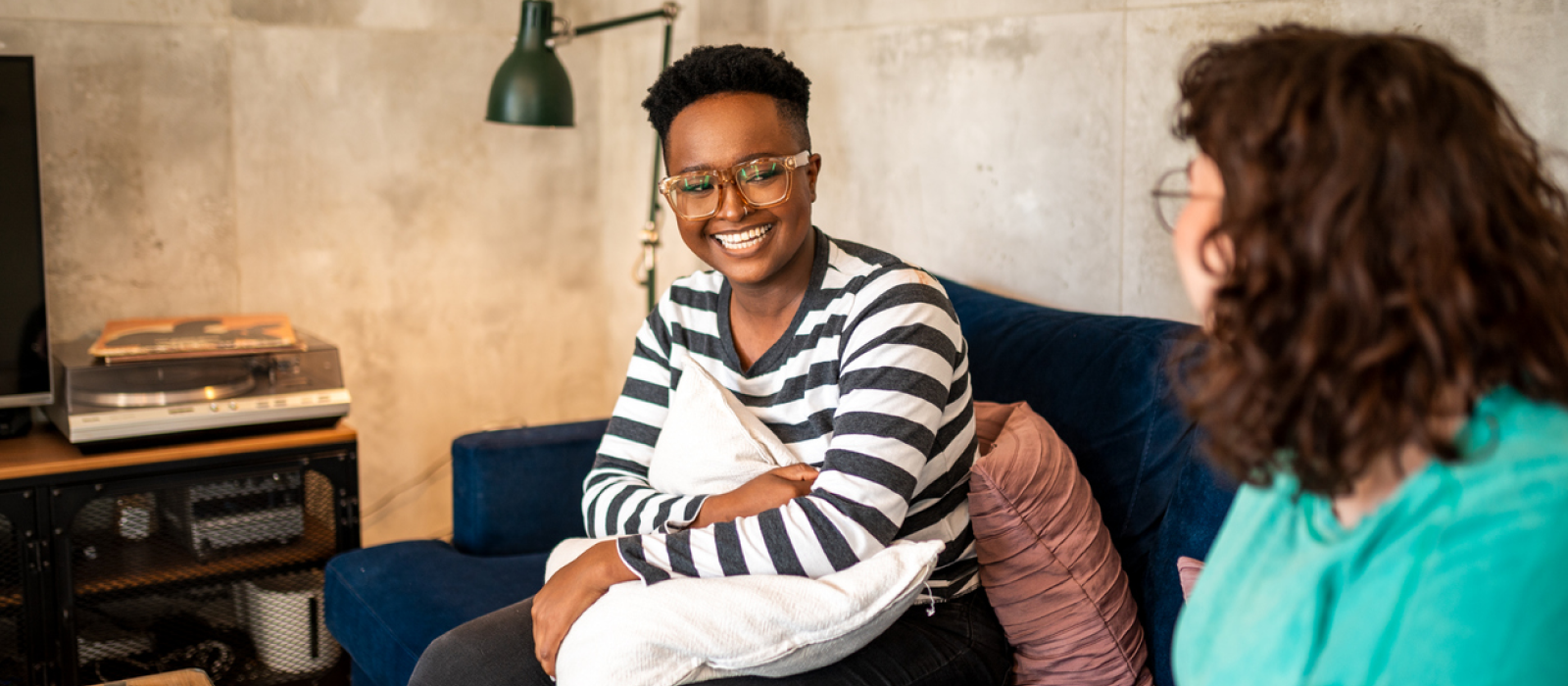
Table of Contents
Yes, Empaths May Have More Anxiety—Here’s How to Cope

Written By: Ashley Laderer

Clinically Reviewed By: Dr. Don Gasparini
January 12, 2024
7 min.
Although empathy is a gift, it can be a double-edged sword, leading to increased anxiety. Learn more about empaths, anxiety, and how to cope.
Learn more about our Clinical Review Process
Table of Contents
Do you absorb others’ emotions and energy? Does your loved ones’ pain affect you? Are you often overwhelmed by deep emotions? If so, you’re most likely an empath, defined by Charlie Health Primary Therapist Alysson Thewes, LCSW, as “ someone who can sense, read, and relate to or empathize with other people’s emotions and often takes on or absorbs these emotions, too.”
Being an empath is a beautiful thing –– however, it can also be a double-edged sword since it can make you more susceptible to emotional overload. That’s why many empaths experience intense anxiety that can interfere with their day-to-day life and functioning. Keep reading to learn more about why empathy is often linked to anxiety and how to cope with anxiety related to being an empath.
Join the Charlie Health Library
Get mental health updates, research, insights, and resources directly to your inbox.
You can unsubscribe anytime.
The connection between empaths and anxiety
There are actually two kinds of empathy: cognitive empathy and affective empathy. The former is truly understanding how and why someone feels a certain way, whereas the latter is truly feeling what the other person feels. Both cognitive empathy and affective empathy can be emotionally taxing, leading to anxiety.
For all kinds of empaths, there might be a fine line between their own emotions and others’ emotions –– and this line can definitely get blurry. When the line is blurred, it can create challenges for an empath’s emotional state, including anxiety.
Also, by nature, empaths absorb the emotions of those around them. This non-stop energy absorption can be draining and lead to heightened stress levels, ultimately paving the way for anxiety to take root.
Not to mention, since empaths feel things so deeply, this could amplify their own anxiety. “Just as empaths are more in touch with other people's feelings, they're also often more in touch with their own feelings –– both good and uncomfortable,” Thewes says. “The anxiety can feel more pronounced. It can feel like it's more heavy or like you can't get it to go away.”
To take things a step further, many empaths also fall into the “highly sensitive person” category. Being a highly sensitive person means that you are not only very sensitive to other people’s energies and emotions but also super attuned to sensory stimuli and environmental factors. For example, if you’re a highly sensitive person, you may get extremely overwhelmed by loud noises and bright lights. Big crowds can be extremely uncomfortable, too. All of this can result in sensory overload, which can be anxiety-inducing in and of itself.
7 tips for how empaths can cope with anxiety
Empathy doesn’t have to affect your mental health negatively. You can absolutely take measures to cope with anxiety and improve your mental health as an empath. Here are seven therapist-approved tips to try for coping with anxiety as an empath.
1. Be self-aware
In this situation, awareness is key, Thewes says. It’s important to recognize that you’re an empath with anxiety and to keep an eye on your thoughts and feelings so you can try to get ahead of emotional overload.
“Acknowledging that anxiety is there is the first step,” Thewes says. “Then, an empath can get curious about what just happened. Ask yourself, ‘Where's this anxiety coming from?’ Once that's determined, an empath can choose the next best step.”
2. Try journaling
Journaling can be a great tool for empaths, Thewes says. When you feel completely overwhelmed with emotions and anxiety, putting pen to paper can force you to slow down and take a step back.
Writing about your feelings can help you get introspective and can be very cathartic, Thewes says. Plus, reading back what you wrote can help you better understand what triggered you and exactly how you’re feeling.
3. Spend time somewhere peaceful
It’s super important for empaths to be able to retreat to somewhere peaceful and have much-needed alone time to decompress and recharge. Whether it's a cozy corner at home or a serene place out in nature, seek out a sanctuary that provides you with refuge from the non-stop emotional stimuli of the outside world. During this alone time, you can relax with a pet, read a favorite book, write in a journal, or meditate, Thewes says.
Relaxing in a non-stimulating environment is also especially helpful for highly sensitive people. On top of getting away from other people’s energies, you might want to be somewhere dark and quiet to help cope with sensory overload and return to equilibrium.
4. Self-regulate with breathing exercises
If you feel anxiety start to creep up, try to tune into your breathing. You can harness your breath and use it as a tool to help you ground down into your body and calm down. Thewes recommends doing a visual deep breathing exercise.
“As we take one big breath, we picture the oxygen going in as one color, and then we hold it for as long as we feel comfortable. Then when we exhale, we picture it as a different color,” Thewes says. “Integrating our mind's eye to come up with and visualize the colors can really help when we're feeling elevated or anxious to stop the racing thoughts.”
You may also want to test out other breathwork techniques to see what works best for you. For example, box breathing involves breathing in, holding it, breathing out, and holding it for equal durations of time, commonly four seconds. Breathe in for four, hold for four, exhale for four, and hold for four again, and keep repeating the cycle. Or, you can try 4-7-8 breathing, which involves inhaling for the count of four through your nose, holding it for seven, and slowly exhaling through the mouth for eight.

Guided Sleep Meditation: Let Go of Anxiety & Calm Your Mind
Kera Passante, MS, LPC
5. Learn to express your feelings healthily
Some empaths might hold in their emotions, believing that keeping things to themselves is the only way to avoid burdening others –– but bottling things up is no help. One of the best ways to healthily express your feelings to someone else without coming across as accusatory is to use “I statements,” saying, “I felt X when Y happened.”
“Come at it from a place of not accusing or pointing fingers, but stating how you felt, and then just open it up for conversation,” Thewes says. This is a great way to express emotions and open up a dialogue about it when there’s another person involved.
6. Practice self-compassion
When you’re feeling anxious, it can be easy to beat yourself up for feeling this way. However, this is a chance to reframe your thoughts, practice self-compassion, and be kind to yourself. Get introspective and be mindful of your thoughts and feelings. Speak to yourself how you’d speak to someone you love and care about.
“If someone finds themselves being self-deprecating or judgmental, thinking something like, ‘I just wish I wasn't like this,’ –– catch that thought and reframe it. Say something like, ‘Being an empath is a gift. How can I make this work for me?’” Thewes says.
7. Set boundaries
Last but certainly not least, one of the most helpful things you can do for yourself is to set and enforce boundaries. Empaths are oftentimes people-pleasers who don’t want to let anyone down or potentially hurt anyone, and setting boundaries is a way to combat this. Empath boundaries might look like recognizing when to step back, say no, and prioritize your own emotional well-being and energy without feeling guilty about it.
Boundaries may also include only making yourself available in a social situation for a certain amount of time and recognizing when to step back from emotionally charged situations. Recognizing when to disengage is crucial. Taking this step back allows you to protect your peace and gain perspective on the situation.
Of course, this is easier said than done, but the benefits are worth it. “Learning to say no or learning to offer alternatives can be really liberating,” Thewes says.
Remember: setting boundaries isn’t selfish. In fact, you can look at boundary-setting as an important form of self-care and self-love. Establishing and enforcing boundaries lets you navigate your interpersonal relationships with a greater sense of control, making sure that you can continue to offer support and empathy without compromising your own emotional stability.

How Charlie Health can help
If anxiety is getting in the way of your daily life and you think you may have an anxiety disorder or another condition, Charlie Health is here to help. Our virtual Intensive Outpatient Program (IOP) provides more than once-weekly mental health treatment for teens and young adults dealing with complex mental health conditions. Our expert clinicians use evidence-based therapies across individual counseling, family therapy, and group sessions. Anxiety doesn’t have to rule your life. Fill out the form below or give us a call to start healing today.





